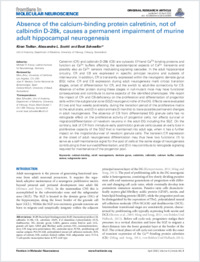Absence of the calcium-binding protein calretinin, not of calbindin D-28k, causes a permanent impairment of murine adult hippocampal neurogenesis
- Todkar, Kiran Unit of Anatomy, Department of Medicine, University of Fribourg, Switzerland
- Scotti, Alessandra L. Unit of Anatomy, Department of Medicine, University of Fribourg, Switzerland
- Schwaller, Beat Unit of Anatomy, Department of Medicine, University of Fribourg, Switzerland
-
23.04.2012
Published in:
- Frontiers In Molecular Neuroscience. - 2012, vol. 5, p. 56
English
Calretinin (CR) and calbindin D-28k (CB) are cytosolic EF-hand Ca²⁺-binding proteins and function as Ca²⁺ buffers affecting the spatiotemporal aspects of Ca²⁺ transients and possibly also as Ca²⁺ sensors modulating signaling cascades. In the adult hippocampal circuitry, CR and CB are expressed in specific principal neurons and subsets of interneurons. In addition, CR is transiently expressed within the neurogenic dentate gyrus (DG) niche. CR and CB expression during adult neurogenesis mark critical transition stages, onset of differentiation for CR, and the switch to adult-like connectivity for CB. Absence of either protein during these stages in null-mutant mice may have functional consequences and contribute to some aspects of the identified phenotypes. We report the impact of CR- and CB-deficiency on the proliferation and differentiation of progenitor cells within the subgranular zone (SGZ) neurogenic niche of the DG. Effects were evaluated (1) two and four weeks postnatally, during the transition period of the proliferative matrix to the adult state, and (2) in adult animals (3 months) to trace possible permanent changes in adult neurogenesis. The absence of CB from differentiated DG granule cells has no retrograde effect on the proliferative activity of progenitor cells, nor affects survival or migration/differentiation of newborn neurons in the adult DG including the SGZ. On the contrary, lack of CR from immature early postmitotic granule cells causes an early loss in proliferative capacity of the SGZ that is maintained into adult age, when it has a further impact on the migration/survival of newborn granule cells. The transient CR expression at the onset of adult neurogenesis differentiation may thus have two functions: (1) to serve as a self-maintenance signal for the pool of cells at the same stage of neurogenesis contributing to their survival/differentiation, and (2) it may contribute to retrograde signaling required for maintenance of the progenitor pool.
- Faculty
- Faculté des sciences et de médecine
- Department
- Département de Médecine
- Language
-
- English
- Classification
- Biological sciences
- License
- License undefined
- Identifiers
-
- RERO DOC 29138
- DOI 10.3389/fnmol.2012.00056
- Persistent URL
- https://folia.unifr.ch/unifr/documents/302461
Statistics
Document views: 59
File downloads:
- sch_acb.pdf: 132
